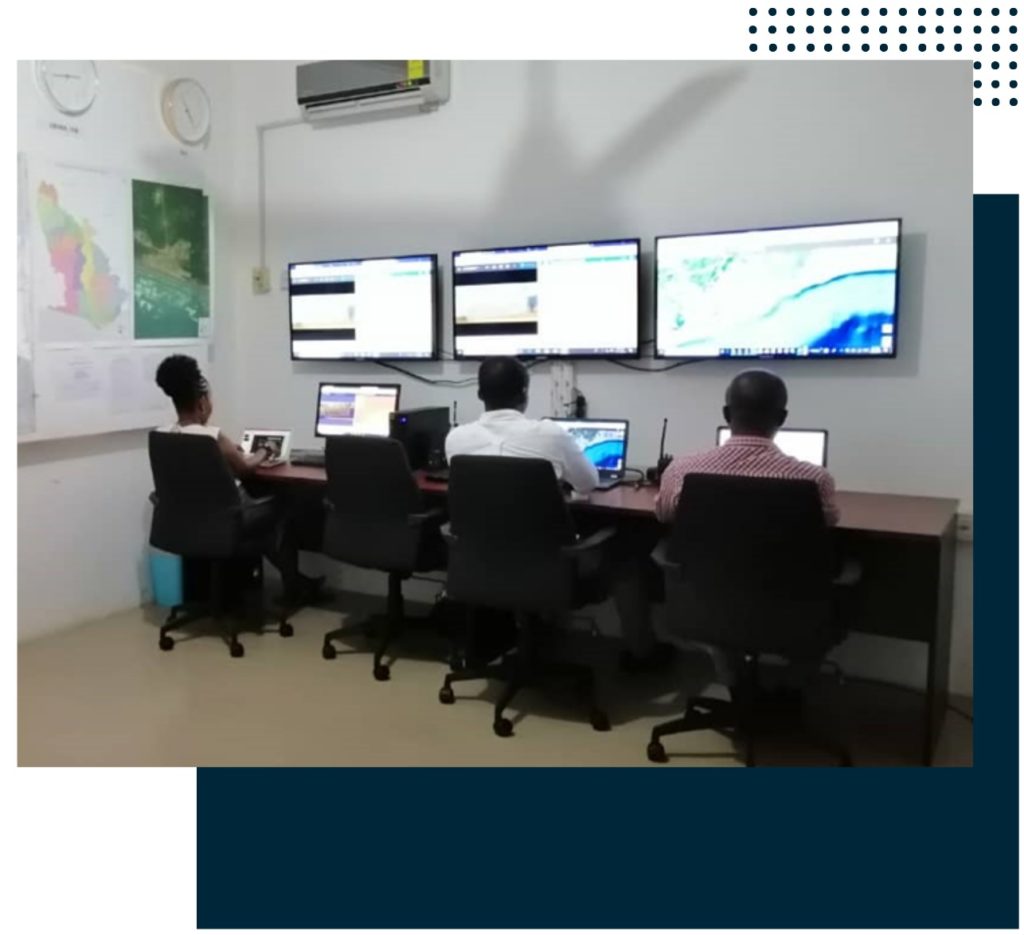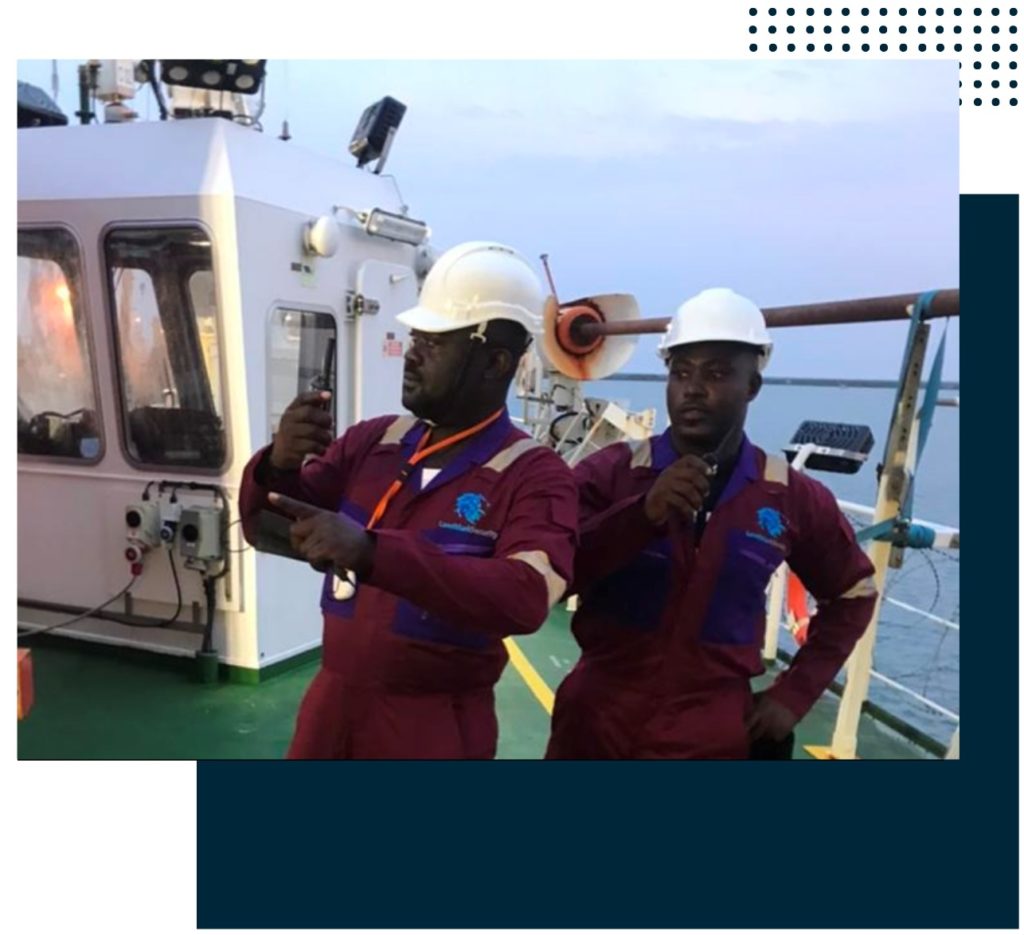LANDMARK SECURITY – COMPANY PROFILE
LandMark Security: Providing Specialised Security Consulting in Ghana
Joined ICoCA in September 2013
ICoCA Certified Member since August 2021
A Responsible Security Provider in West Africa
LandMark Security (LMS) is a security consulting company specialising in complex land and offshore project support. Founded in 2009, LandMark integrates experience in policy, governance, and global operations to service the African continent from its headquarters in Accra, Ghana. The company frequently collaborates with governments and multinational organisations to provide a range of services including protective security, maritime and energy security, incident and risk management, and crisis response. Beyond its security platform, LandMark is dedicated to respecting the regional cultures within its areas of operation and places governance and regulatory compliance at the heart of its work.
LandMark Security was a signatory of the International Code of Conduct’s Articles of Association in 2013 and has since contributed to the framing and development of several of the organisation’s policy plans. In addition to ISO 9001, ISO 18788, and PSC.1 certification, LandMark continues to grow its operational initiatives while holding itself to the highest industry standards.
Human Rights Due Diligence and the Role of ICoCA
LandMark’s ICoCA membership reflects the company’s business principles and overarching commitment to human rights adherence within the sector. “Our decision to join ICoCA was partly motivated by our quest to be [a] private security company that operates ethically and responsibly, and to be part of a growing, industry-led Association that understands, encourages, and exhibits remarkable respect for human rights in security,” explains Frank P. Amoyaw, Chief Executive Officer of LandMark Security and ICoCA Board Director representing Africa. “As a security company operating in our part of the world, we want to continue to focus on respect for the people we work with and the communities in which we operate.”
In addition to sharing the human rights focus of the Association, Mr. Amoyaw believes that ICoCA certification provides LandMark with the tools to ethically serve both its clients and their communities. “Our relationship with ICoCA has helped in diverse ways to strengthen our security operational systems through the established certification process,” Mr. Amoyaw continues.
“To a large extent, we have received tremendous support and guidance in a lot of areas, including human rights due diligence and [protection against sexual exploitation and abuse] PSEA through our engagement with ICoCA.”
 The True Value of Responsible Operation
The True Value of Responsible Operation
Despite growing competition within the private security market, LandMark believes there is real value in providing responsible security in Ghana. “Being a responsible security company in our region doesn’t necessarily translate into direct financial dividends, however, it provides us with the leverage, acceptance, and credibility necessary to differentiate from our competitors,” Mr. Amoyaw explains. “It does assure operational effectiveness, peace of mind, and the reassurance that we are contributing to making our society and industry more appealing and acceptable.”
LandMark recognises that not all profits can be measured in dollars and cents, and maintains that setting a positive example for human rights compliance in West Africa may encourage other companies to follow suit and improve their own standards. In addition to the benefits that LandMark has acquired through its ICoCA membership, including access to larger tenders, Mr. Amoyaw believes that human rights due diligence is simply “the right thing to do.”
Adapting to Changes in the Global Security Frontier
Since joining ICoCA ten years ago, the private security sector has undergone transformational developments, such as the introduction of new technologies and application of artificial intelligence. LandMark Security views these advances as “untapped opportunities to drive innovative strategies,” allowing organisations like LandMark “to become more agile, efficient, and competitive.”
According to Mr. Amoyaw, the industry has seen a similar shift in client preferences and expectations, as increased competition has allowed contracting companies to become more selective. “Our clients want to see us do more for our employees, to respect their rights and the communities we operate in,” says Mr. Amoyaw.
Improving security providers’ adherence to human rights, however, is a focus that has not changed, as standards continue to improve through the work of organisations like ICoCA. “With new threats and regulations arising every day, the need for good security governance remains a top priority in the industry,” Mr. Amoyaw maintains. “[Our clients] want us to show our commitment to advancing and promoting human rights in our everyday activities.”
Increasing People’s Access to Resources for More Responsible Security
But despite improvements to human rights compliance worldwide, responsible operation in complex environments is made more difficult when there is limited access to tools and trainings. “One of the major challenges [to responsible operation] is ensuring that personnel are adequately trained and possess the right skills and knowledge to handle the security needs of the environment,” Mr. Amoyaw acknowledges. Increasing company access to these kinds of services and encouraging organisations to undergo ICoCA’s due diligence procedures will not only raise industry standards as a whole, but will more effectively minimise human rights violations within private security.
Ensuring that private security providers understand the communities in which they operate is another challenge Mr. Amoyaw identifies as threatening respect for human rights within the industry. “Maintaining the safety and security of the operating environment while not infringing on the fundamental rights and privacy of the people within is a delicate balancing act,” Mr. Amoyaw says. By expanding access to country-specific trainings and working directly with local organisations, ICoCA has the potential to make private security providers more aware of the people they may be affecting and encourage respect for local populations.
Facing the Future of Private Security Together
As pacesetters for responsible security within the industry, ICoCA and its Member companies are committed to looking inwards and making necessary improvements in the years ahead. Instead of shying away from changes in the security landscape, ICoCA and its Members must leverage emerging technologies, adapting to new tools and improving efficiency.
“It is time for us to re-evaluate our work, be honest with our shortcomings, and prepare to think differently as we seek to bring value to our Members and shareholders,” Mr. Amoyaw states. By collaborating more closely with its Members, ICoCA may “provide sustainable pathways for industry members to attain certification in compliance with the Code.”
Above all, these obstacles to advancing human rights cannot be tackled by one organisation alone. LandMark Security is “devoted to working towards the collective goal of creating a secure, accountable, and transparent environment within the security industry,” and points to its ICoCA membership and partnerships with adjacent companies as crucial to achieving this objective.
According to Mr. Amoyaw, “together, we can make significant strides towards ensuring that our industry is well-managed, accountable, and reliable.”
Learn more about LandMark Security by visiting their website.
